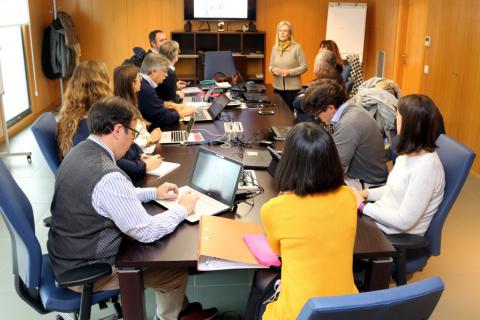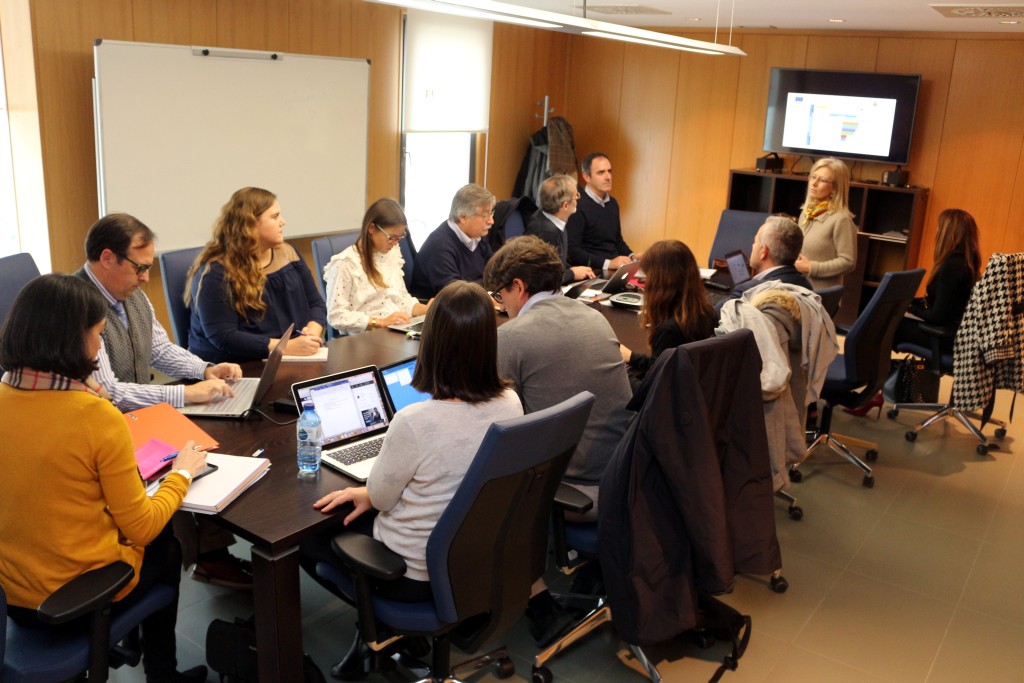First transnational meeting of the European SmartArt Project
29 Oct 2019

Last week the first transnational meeting of the European Project co-financed by the Erasmus + program of the European Union Self-regulated Learning in SmartArt 2019-1-ES01-KA204-065615 was held.
During the meeting, a plan was drawn up for the actions that will take place until September 2020 in which the second transnational meeting will be held at the Universidade do Minho (Portugal). The first intellectual product is expected to be the SmartArt Virtual Classroom, which will be piloted in the spring of 2020 at the Burgos Museum, the Silos Foundation and various municipalities in the Province of Burgos and Valladolid.
This virtual classroom will facilitate interactive learning spaces and includes an elaborate system for recording and interpreting the interactions of classroom users, making it possible to apply data mining techniques to detect different learning patterns.
The meeting was held with a high degree of collaboration and involvement by all the partners participating in the development of this project. PhD Rebeca Cerezo Menéndez from the University of Oviedo, PhD Leandro Almeida and PhD José Alberto Lencastre from the University of Minho (Portugal) and PhD Miguel Ángel Carbonero from the University of Valladolid, as well as Mr Francisco Javier Sancho Varela y Ms Rocío Martínez from the company Bjäland Technologies (Spain) -in charge of technological development- and Ms Nadia Theuma from Paragon Limited (Malta) -responsible for the multisectoral transfer of results attended. From the University of Burgos, all the members of the Research Team, PhD René Jesús Payo Hernánz, PhD María Consuelo Sáiz Manzanares, PhD Gonzalo Andres López, PhD María José Zaparaín Yáñez, PhD Carlos Pardo Aguilar and PhD María del Camino Escolar Llamazares, PhD Nuria Alonso Santander and Professor Sandra Rodríguez Arribas participated in this meeting. Also attended Ms Miriam Manrique Domingo, head of European projects at the OTRI-OTC at the University of Burgos, who reported on the requirements for budget management and the development of grant agreements.
The University of Burgos leads the European Project called "Self Regulated Learning in SmartArt", selected in the Call for Erasmus + KA204 Program in the field of "Strategic Associations", with an allocation of € 221,886. Together with the UBU, the University of Oviedo, the University of Minho (Portugal) and the University of Valladolid, as well as the companies Bjäland Technologies (Spain) -in charge of technological development- and Paragon Limited (Malta) -responsible as collaborating partners of the multisectoral transfer of results-.

It is an innovative project focused on the generation of new ways of teaching Art History through the use of new technologies. The idea will apply eye-tracking software that will allow users to record their motivation and learning pattern, thereby creating different profiles and adapting the learning process to the needs of each person. The initiative thus seeks to “look” at art with “other eyes”.
The project focuses on the design of a virtual classroom for learning these contents aimed at the group of adults. The generation of a virtual environment that integrates self-regulated learning tools is proposed, generating a personalized context in which different hypermedia resources are used (avatars, automatic feedback, records of learning patterns, etc.). To this end, various data processing and analysis techniques will be used, from quantitative methodologies, artificial intelligence techniques and data mining, to qualitative methods (mixed method).
The use of these novel tools to facilitate the teaching of Art History creates a virtual learning environment in which the dissemination of the value of cultural heritage is encouraged. Following the approach of the recent European Year of Cultural Heritage (2018), the project is fully aligned with the guidelines of the regional research strategy (RIS3 2014-2020), considering that the dissemination to society of content related to history and art fosters the enhancement of the identity and cultural wealth of the European Union. To achieve these objectives, special attention will be paid to the dissemination and transfer of results to society, in line with the objectives of the Strategic Plan for Research, Knowledge Transfer and Innovation of the University of Burgos 2019-2024.
During the next 3 years (2019-2021), the research team will focus on developing intellectual products focused on the development of methodological guides adapted to the virtual learning environment and the different learning patterns of each of the students, with special attention to its dissemination. To achieve this objective, the initiative has designed a solid transfer strategy that will focus on the implementation of Smart Art in various municipalities in the province with the collaboration of the Burgos Provincial Council and also with the support of various cultural entities. relevant that are committed to the results of this transfer (Silos Foundation, Burgos Museum, UBU Alumni ...). To consolidate this approach, all the products generated will be available in the partners' repositories and on the web pages of the collaborating cultural entities, promoting a clear commitment to the transfer of knowledge to society. Smart Art will thus disseminate the values of artistic, historical and cultural heritage through a new perspective that is already being worked on by the team coordinated by the University of Burgos.
The project has been divided into two areas of intervention that will be coordinated and integrated for the generation of results by forming a multidisciplinary team and involving researchers and specialists from various areas of knowledge at the University of Burgos:
On the one hand, the group related to the contents of History, Art and Heritage (Digital Humanities), which will be led by René Jesús Payo Hernanz, Professor of Art History and Director of the PART Group. This working group will be coordinated by María José Zaparaín Yáñez (Art History) and will also have the collaboration of Gonzalo Andrés López (Human Geography) and Gemma Miguel (University of Experience).
On the other hand, the group referring to self-regulated learning in virtual environments (Self-Regulated Learning), which will be led by María Consuelo Sáiz Manzanares, Professor of Evolutionary and Educational Psychology and Director of the DATAHES Research Group. This working group will have the advice of professors from the Area of Computer Languages and Systems, Carlos Pardo Aguilar and Sandra Rodríguez Arribas. Members of other Research Groups of the University of Burgos will also participate: DATAHES- Camino Escolar Llamazares, Nuria Alonso Santander and Sandra Rodríguez Arribas.
